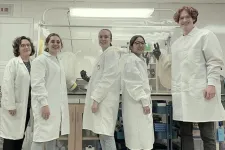(Press-News.org) Blanca Barquera's investigation into the energy-generating processes of Bacteroides, the most abundant member of the gut microbiome, and their impact on our well-being holds the promise of significant advancements in human health. Barquera is a professor at Rensselaer Polytechnic Institute in the Departments of Biological Sciences and Chemistry and Chemical Biology.
In recent years, it has become increasingly clear that an unhealthy gut is more than just a source of digestive troubles. A healthy gut is a crucial contributor to heart, kidney, and brain health, and it helps us fend off sickness. The balance of bacteria in our gut is crucial to our overall health, and Bacteroides play a pivotal role in maintaining this balance.
Barquera has been awarded a grant of nearly $3.3 million over five years from the National Institute of Health's National Institute of Allergy and Infectious Diseases. The grant aims to improve our understanding of the energy metabolism of Bacteroides.
"Ultimately, we hope this research helps us better understand the features of these bacteria so that we can design more effective probiotic formulations," said Barquera. “Probiotics help us achieve bacterial balance in our guts, which has far-reaching implications for our overall health."
Barquera's group previously found that Bacteroides have a complex respiratory chain, or system of electron carriers, that provides substantial energy and enables essential metabolic processes. "Our preliminary results reveal new and unexpected complexities of the respiratory pathway, new terminal electron acceptors that we predict contribute to bacterial and host fitness, and differences between Bacteroides species that likely impact microbiota composition," said Barquera.
In this research, Barquera's research group will study essential enzymes involved in energy metabolism that drive the transport of carbohydrates into the cell. These carbohydrates are a significant part of the host's diet and can be easily utilized by Bacteroides species for nutrients.
The researchers will also investigate how Bacteroides can use Vitamin K from the host's diet. Vitamin K is an essential nutrient for both humans and bacteria, and Barquera seeks to understand how bacteria can modify this nutrient into forms it can use for metabolism.
Barquera will also study how another important respiratory enzyme can protect bacteria against toxic nitric oxide produced by the host intestine during inflammation.
With these three goals in mind, Barquera ultimately seeks to understand how human gut bacteria can influence the health of their hosts. The basic knowledge revealed by this research can provide a foundation for interventions in the microbiome that improve human health.
"I look forward to watching Professor Barquera's research illuminate the physiology of gut Bacteroides," said Curt Breneman, Ph.D., dean of Rensselaer's School of Science. "Insights from her work will provide a greater understanding of how gut health can be optimized by intervention to improve overall health and prevent disease."
###
About Rensselaer Polytechnic Institute:
Founded in 1824 for the application of science to the common purposes of life, Rensselaer Polytechnic Institute is the first technological research university in the United States. Today, it is recognized as a premier university, noted for its robust and holistic learning community that connects creativity with science and technology. RPI is dedicated to inventing for the future, from shaping the scientists, engineers, technologists, architects, and entrepreneurs who will define what’s next for humanity, to research that bridges disciplines to solve the world's toughest problems. Learn more at rpi.edu.
Contact:
Katie Malatino
malatk@rpi.edu
838-240-5691
For general inquiries: newsmedia@rpi.edu
Visit the Rensselaer research and discovery blog: https://everydaymatters.rpi.edu/
Follow us on Twitter: @RPINews
END
Jeffrey Elam, senior chemist, Distinguished Fellow, and founder of the atomic layer deposition (ALD) research program at the U.S. Department of Energy’s Argonne National Laboratory, was named as a fellow of the Electrochemical Society (ECS), which focuses on advancing theory and practice at the forefront of electrochemical and solid-state science and technology. Elam, who has been with the lab since 2002, has been a trailblazer in thin film coating science and technology for over 20 years, ...
Oregon Health & Science University researchers have found that despite legislation in 19 states requiring insurers to cover a 12-month supply of contraception, patients aren’t receiving a year’s worth of their prescription; most receive just three months or less.
Their study recently published in the journal JAMA Health Forum shows that policies requiring coverage of a 12-month supply of short-acting hormonal contraception — most commonly the birth control pill — have not been fully implemented, resulting in no substantial increases nationally in year-long prescription orders. This leaves many patients at an increased risk for unintended ...
All living organisms emit a low level of light radiation, but the origin and function of these 'biophotons' are not yet fully understood. An international team of physicists, funded by the Foundational Questions Institute, FQxI, has proposed a new approach for investigating this phenomenon based on statistical analyses of this emission. Their aim is to test whether biophotons can play a role in the transport of information within and between living organisms, and whether monitoring biophotons could contribute to the development of medical techniques for the early diagnosis of various diseases. Their analyses of the measurements of the faint glow emitted by lentil ...
Antibiotic-resistant bacterial infections often occur in patients with chronic inflammatory intestinal conditions, such as inflammatory bowel disease, and in patients who have taken antibiotics for a long time. Gram-negative bacteria such as Enterobacteriaceae are a common cause of these infections and have few treatment options. Fecal microbiota transplants have shown promise to curb some of these infections, but their composition varies between batches and they aren’t always successful.
Researchers at Keio University School of Medicine in Tokyo and the Broad Institute of MIT and Harvard have isolated ...
Sometimes all it takes is a little push.
That is the conclusion of a recently published study in which doctors used a handheld ultrasound device to nudge patients’ kidney-stone fragments.
As many as 50% of patients who have kidney stones removed surgically still have small fragments remaining in the kidneys afterward. Of those patients, about 25% find themselves returning for another operation within five years to remove the now-larger fragments.
UW Medicine researchers found, however, that patients ...
A recent study has successfully decoded the autotetraploid genome of the wax apple, uncovering its genetic evolution and key factors driving fruit diversity. The research highlights the fruit’s rich antioxidant profile, with promising implications for human health and breeding strategies aimed at enhancing nutritional value.
Wax apple (Syzygium samarangense), known for its crisp texture, rose-like aroma, and health benefits, faces breeding challenges due to its complex genetic diversity and limited genomic data. These obstacles have hindered efforts to improve key fruit qualities such as size and sugar ...
A new study co-led by the Smithsonian and the University of Arizona offers the most detailed glimpse yet of how Earth’s surface temperature has changed over the past 485 million years. In a paper published today, Sept. 19, in the journal Science, a team of researchers, including paleobiologists Scott Wing and Brian Huber from the Smithsonian’s National Museum of Natural History, produce a curve of global mean surface temperature (GMST) across deep time—the Earth’s ancient past stretching over many millions of years. ...
Science has provided more than sufficient evidence to inform a collective and global approach to tackle the continued spread of plastic pollution, according to a new report.
Writing in the journal Science, an international group of experts say the need for worldwide action to tackle all forms of plastic and microplastic debris has never been more pressing.
It is clear that existing national legislation alone is insufficient to address the challenge, they say, and the United Nations’ Plastic Pollution Treaty ...
Estimating past global temperature is important for understanding the history of life on Earth and for predicting future climate. Now, a new reconstruction of Earth’s temperature history over the past 485 million years – based on a method that combines diverse physical proxy data with climate model predictions – reveals a much wider range of climate variability across the Phanerozoic eon than previously understood. The findings highlight atmospheric carbon dioxide (CO2) as the dominant factor controlling climate variability throughout this period, offering new ...
Cooling in the subsurface waters beneath Greenland’s Nioghalvfjerdsfjorden Glacier (79NG) from 2018 to 2021 was driven by European atmospheric blocking, which forced changes in the large-scale ocean circulation of the Nordic seas, researchers report, slowing glacial melt, despite ongoing global warming trends. The findings highlight the importance of regional atmospheric dynamics in influencing glacier stability. Understanding these dynamics is key to predicting the future of glaciers like ...



